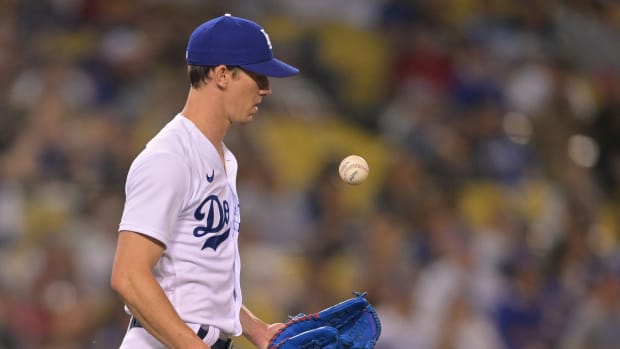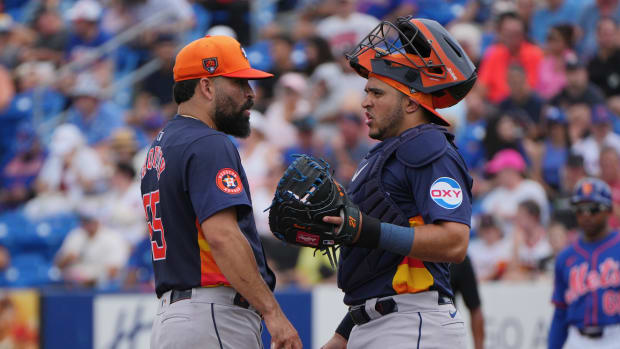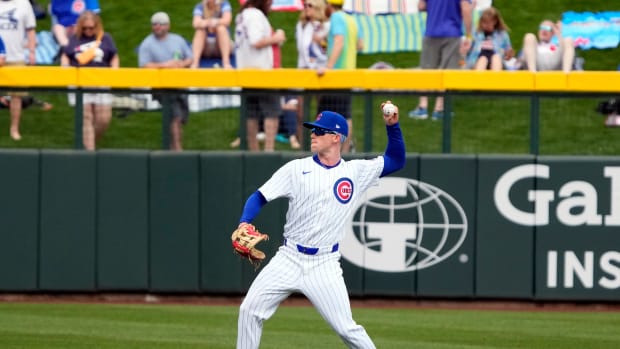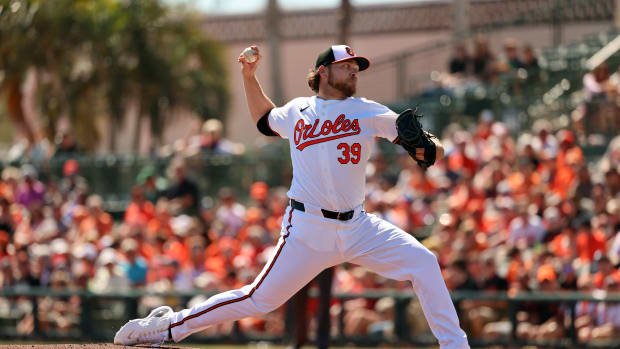Young stars and balanced teams move the game into a new era
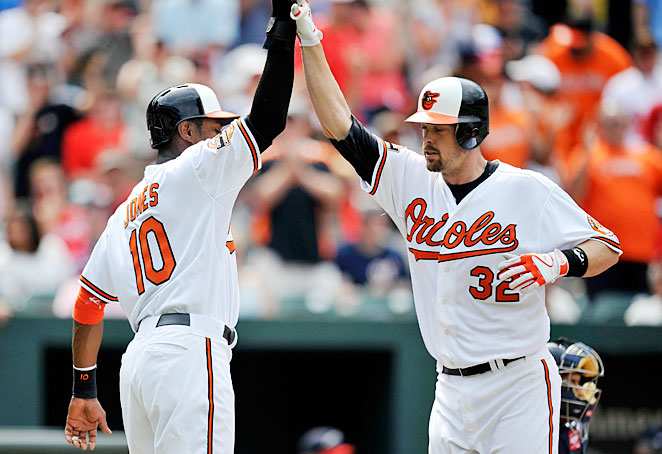
Thanks to potential MVP candidates Adam Jones and Matt Wieters, the Orioles are one of 15 or so teams with a shot at a title this year.
/USA Today Sports
The hints dropped all winter like snowflakes. The New York Yankees were outbid by the Pittsburgh Pirates for one of their own free agents, catcher Russell Martin. The Boston Red Sox, coming off a 93-loss grease fire of a season, repaired their outfield not with Josh Hamilton, but with a choice much farther down the spectrum of money and impact, Shane Victorino. The Philadelphia Phillies, staggering off a .500 season, passed on outfielders Hamilton, B.J. Upton and Michael Bourn in order to trade for Ben Revere and sign Delmon Young.
The days of the I-95 corridor being the seat of power in baseball are over. But just in case you missed the signs since last season ended, Las Vegas made official the decline of Northeast Baseball when it released its preseason odds of each team winning the World Series.
The Phillies, at 20 to 1, have the best odds among the erstwhile Big Three of winning the World Series -- and that puts them behind eight other clubs. Here's all you need to know about how the baseball world has turned over: the Nationals, Dodgers, Tigers, Reds and Blue Jays all have better odds of winning the World Series than the Yankees, Red Sox or Phillies.
Now think about this for a minute: Washington, Los Angeles, Detroit, Cincinnati and Toronto have never won the World Series since the wild card format first was used in 1995. That's five franchises with no titles over 18 years -- 0-for-90 in combined seasons -- and they're all a better bet to win it all than New York, Boston and Philadelphia, which have combined for eight titles in that time.
That's not all when it comes to this new age in baseball. Just as last season gave us the surprise of Oakland winning 94 games and the AL West and Baltimore winning 93 games and one of the AL wild cards (combined World Series appearances in the wild card era by the A's and Orioles before last year: zip), this season will give us another turnaround story. In 17 of the 18 wild-card seasons, at least one team made the playoffs the year after a losing season. Don't be surprised if Kansas City, Seattle or Pittsburgh becomes this year's version of the A's and O's. (Combined World Series appearances in the wild card era by the Royals, Mariners and Pirates: you got it, zip.)
The Jays? The Orioles? The Pirates? Contenders?
Since when did major league baseball become a hot tub time machine? What's happening is that the Yankees, Red Sox and Phillies haven't been able to keep up with the massive changes that have hit baseball. We are three years into an era of pitching dominance that shows no signs of abatement. The game no longer is being decided by experience and power (both of which favor high payrolls) but by youth and run prevention (which favor player development and lower payrolls).
RELATED: SI.com experts make their picks for the season ahead
Think about some of the dominant storylines coming out of the spring training camps of the Yankees, Red Sox and Phillies. New York nervously monitored the ankle of 39-year-old shortstop Derek Jeter (not to mention injuries to Alex Rodriguez, 37, Mark Teixeira, 33 next month, and Curtis Granderson, 32), Boston nervously monitored the Achilles' heels of 37-year-old DH David Ortiz and Philadelphia nervously monitored the arm strength of 35-year-old pitcher Roy Halladay.
Jeter, Ortiz and Halladay are vital cogs to their teams. They are some of the oldest and most expensive players at their positions. They are proxies for what the game is not. The upstart teams are not playing by those kinds of rules any more.
Much of the fun of baseball is its unpredictability, and the irony about this information age is that the more we know about it -- we can track thrown and hit baseballs with Department of Defense technology, collect and mine data with Silicon Valley computational power -- the more unpredictable is the ultimate outcome. Predictions have never been more difficult because of the expanded postseason format and the depth of quality teams. Teams need to survive the minefield of three or four rounds of postseason play.
Most impactful of all, as pitching, especially young pitching, has taken over the game, more teams can compete at a high level. Under the old rules of engagement, it was expensive and difficult to construct a deep lineup loaded with power. Consequently, great gaps of talent separated the haves from the have nots.
But now any team that develops good arms has a chance of winning the World Series -- as the San Francisco Giants have done two of the past three seasons, including last year, when they hit the fewest home runs in all of baseball. The great gaps no longer exist. Indeed, the difference between the best team in baseball -- say, Washington -- and the 15th-best team in baseball -- say, Baltimore -- never has been thinner in the history of the game. In a lower run-scoring environment and with more quality teams, the "super" team is being driven right out of the game.
Take a look at this snapshot and you'll see that in this environment you're not going to see truly dominant teams:
It's a somewhat similar concept to the one the late Harvard professor Stephen Jay Gould embraced to explain why the .400 hitter disappeared from baseball over more than the last half century. It wasn't that hitters got worse. In fact, they improved so much as a whole that the variation shrunk. In other words, it's much harder to stand out when the entire field has improved so much.
It doesn't mean the death of the prediction business. Indeed, it becomes more fun with the more true options you have. Twenty teams have never won the World Series in the wild card era, and you can make a case for at least half of them to be the last team standing this year. There are plenty of limbs on which to climb.
If you're looking for one determinant to make the prediction business a little easier, look no further than young pitching. Without question, the greatest single influence on championship baseball today is stability in the starting rotation. And the younger your staff is, the greater the odds are that your rotation will stay healthy.
Put it this way: If you get four starters to make 30 starts each, you're almost guaranteed to be in the playoffs. Forget about tinkering around the margins, middle relief, bench strength, chemistry and all the rest of the architecture of teams that we love to chew on; it really is this simple: over the past five years, 15 teams have sent four starters to the mound at least 30 times each. Eleven of those 15 teams have made the playoffs, including every world champion from 2008-2012.
The Nationals and Tampa Bay Rays, deep in young, reliable starters and with strong defense behind them, are best positioned to profit from how the game is played today. If you're looking for a sleeper team, keep an eye on the Arizona Diamondbacks, who have a rotation of Ian Kennedy, 28, Trevor Cahill, 25, Wade Miley, 26, Brandon McCarthy, 29, and Randall Delgado, 23.
In contrast, consider how much age is being carried by the Yankees, the best symbol of how baseball used to be played. In its rotation New York is counting heavily on Hiroki Kuroda, 38, and Andy Pettitte, 41. Do you know how rare it is to win in any era, let alone this one with the emphasis on youth, with two starters that old? The answer is almost never.
Take knuckleball pitchers out of the equation, and only three times in history have two conventional pitchers age 38 and older started 30 times each for the same team. Here they are:
So in baseball history you get only one team, the 2003 Yankees, who made the playoffs with two starters 38 or older making regular turns in the rotation -- and that was another era, when amphetamines were legal and there were no penalties for PEDs.
The New York age issue isn't confined to the rotation, either. Mariano Rivera, 43, coming off knee surgery and bothered in spring training by migraines, is the closer. The roster has four of the eight starting position players from the All-Star Game -- the 2006 All-Star game, that is: Ichiro Suzuki, 39, Jeter, 39, Alex Rodriguez, 37, and Vernon Wells, 34. It also has the injury risks of Kevin Youkilis, 34, and Travis Hafner, 35, with full-time jobs.
Suzuki and Jeter, whenever he comes off the disabled list, are scheduled to bat 1-2 in the order, just as they did at that Midsummer Classic seven years ago. What are the odds of putting together a championship team with two regulars that old? Again, it almost never happens. Here are the only teams with two qualified regulars that old in their lineup in full seasons:
Once again, you see how the Yankees are fighting history. Only one team, the '83 Wheeze Kids of Philadelphia, made the playoffs with two regulars as old as Suzuki and Jeter.
Older players have become the liabilities they used to be. Nobody over the age of 36 hit 20 home runs last year. The Steroid Era, the I-95 Corridor of Power . . . those eras are over, and in hindsight seem all the more ridiculous with how the game is played today. Starting in 2001, for instance, Barry Bonds won NL MVP Awards at ages 36, 37, 38 and 39. It was, of course, freakish and unnatural to be that much better than everybody else at such an old baseball age.
Of the other 20 MVPs from 2001-12, 20 of them were between the ages of 25-29 -- and the one exception, the 2007 AL winner, was 31-year-old Alex Rodriguez, whose entire career is subject to suspicion given his admission of 2001-03 steroid use and subsequent connections to Anthony Galea and Tony Bosch.
The next MVPs could come from among Bryce Harper, 20, Mike Trout, 21, Jason Heyward, 23, Freddie Freeman, 23, Eric Hosmer, 23, Justin Upton, 24, Jay Bruce, 26, Andrew McCutchen, 26, Buster Posey (again), 26, Evan Longoria, 27, Ian Desmond, 27, Yoenis Cespedes, 27, Matt Wieters, 27, Adam Jones, 27, Matt Kemp, 28, and Ryan Zimmerman, 28.
Know what's missing on that list of some of the best players in baseball under age 29? No Yankees, Red Sox or Phillies. New York second baseman Robinson Cano turns 31 in October. Boston second baseman Dustin Pedroia turns 30 in August and teammate Jacoby Ellsbury turns 30 in September.
The game belongs to pitching and to youth. Fewer runs means closer games, and closer games with a deeper field and an expanded postseason mean more teams than ever have a shot at winning the World Series. Vegas has figured it out. Odds are, this season will surprise you.































